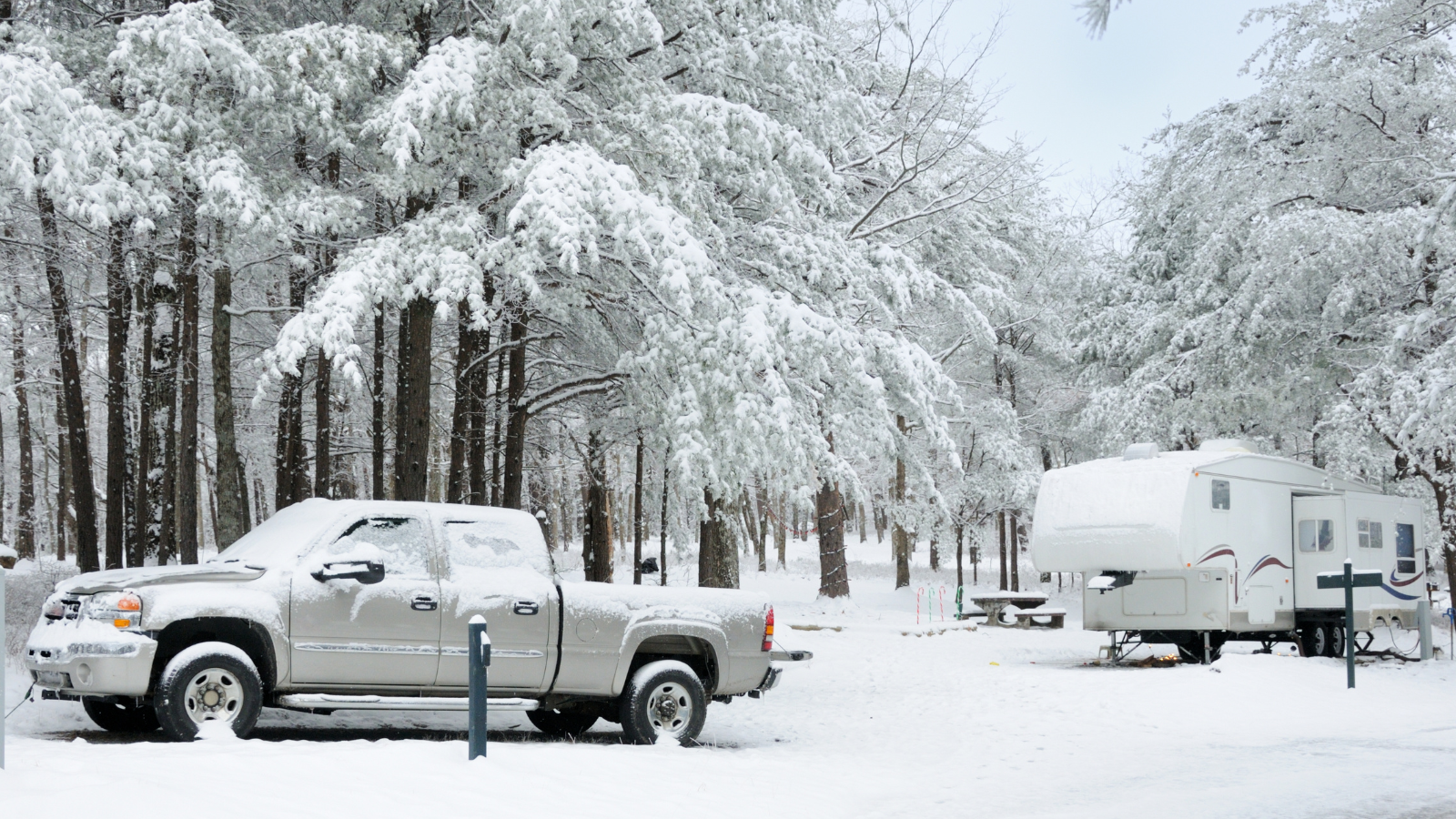When winter wind blows in, a lot of things change with it. Out come the thicker fabrics, menus consist of hot and hearty stews, and our summer memories keep us warm as we await the return of spring.
Yet wintertime in Michigan is a favorite season for many. In addition to the changes in clothing and menu, changes are required to better prepare yourself and your RV to handle the elements to ensure safety and comfort.
Keep the snow off the RV’s roof.
Your RV’s roof is an essential component, and any tears or damage or extra weight can cause it to wear and lead to problems such as water leaks. If you’re camping in the wintertime, take extra good care of your RV’s roof by keeping snow off of it as much as possible. This is important because RV roofs are designed to be flat, making them perfect locations for snow to pile up. There are several ways to achieve this, and a combination is usually the best approach. For one, choose to camp near wind blocks to reduce the amount of snow that impacts your RV. Second, bring along a long-handled bristle brush to help shove piled up snow off the roof. A technique some RVers use is adding a temporary slant to the roof, such as with plywood and propped up with lightweight supports. This helps to deflect some of the snow. Make sure it’s easy to take on and off if you’re planning on camping and traveling.
What if ice settles onto the roof? First, never use hot water as you can accidentally cause cracks and water damage. The safer approach is to chip at the top layer with a plastic tool. Avoid metal as the material tends to be too vigorous on roofing material. If you have your RV winterized and in storage, it should be in covered storage, such as a garage, car port, or barn, with an RV-appropriate cover (aka, breathable) for added separation and protection.
Be prepared with the right equipment.
Winter needs are different than summer needs with it comes to your RV. For one, you need a way to keep your water hoses, pipes, and tanks from freezing. A heated water hose is one way of doing this. Keep the heater running more frequently as the heat ducts are typically near pipes and assist with keeping things warm. Another tip is to use a sewer hose ladder, which keeps the sewer hose at a permanent slope in order to avoid standing water. Standing water can mean frozen water. Likewise, water tanks should never be allowed to get too full. If they end up freezing, the water will expand and could damage the tanks. That being said, pack RV antifreeze to in case either of your water tanks ends up freezing.
An RV skirt is a key piece of equipment for colder climates and colder days as it helps to keep the underside of your RV warm, where all of the lines and hoses and mechanical components reside. An RV skirt also helps to keep the interior of the RV warmer because you’re not “fighting” the cold from underneath the RV.
As for yourself, bring plenty of blankets and quilts and thicker pieces of clothing. Conserve space by placing them in resealable vacuum bags. Have at least two pairs of gloves and two hats; you don’t want to be spending your time looking for a key piece of winter gear when you need it most. Packable hand warmers can help you stay cozy, and a hot water bottle can be very useful on colder nights. Likewise, you should pack a shovel, chains, and rock salt in case you get stuck and need to dig out or find traction.
Stay on top of propane.
When you’re winter camping, your RV’s furnace will be circulating much more frequently – and it all adds up quickly. In the summer, you might be used to hearing the heat turn on only at night. But in the winter in Michigan, it’ll run 24 hours a day. The amount of time you’re used to having with a full tank will be much reduced. It can be tedious but check and possibly refill the propane tank every three or four days. You don’t want to wake up in an ice-cold RV in the middle of the night and have to wait until morning. Some RVers go as far as adding more, larger propane tanks to their holding areas. An electric space heater inside the RV can help keep the interior warm and offset the furnace usage, as can well-insulated windows, foam squares for the floor for added insulation, and blocking off sleeping quarters during the night.
Research the area.
If you’re winter camping someplace new, do the research ahead of time and do things the old-fashioned way and write it all down for easy reference. Know where your propane filling options, business hours, and phone number. Similarly, write down the names, addresses, and phone numbers of RV service providers, and taxi services. Don’t rely on your cellphone to find this important information in case there isn’t service, or something happens to your cellphone. Speaking of which, always make sure your cellphone is fully charged. You can use a solar or portable charger if you don’t want to use the electricity from the RV. In the winter, time is of the essence, so the more quickly you can solve or fix a problem related to your RV, the better off you and your RV will be.

